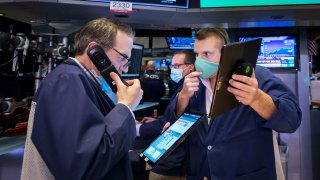
- The Federal Reserve's meeting Tuesday and Wednesday is the big event for markets in the week ahead, with investors hoping for more guidance on the central bank's plan to raise interest rates.
- Earnings season is in full swing with about half the Dow 30 stocks reporting, and reports expected from the biggest market-cap stocks, Apple and Microsoft.
- There is some important economic data in the week ahead, including fourth-quarter GDP and the personal consumption expenditure inflation data.
Market turbulence is likely to continue in the week ahead as the Federal Reserve meets and the biggest of big tech —Apple and Microsoft — report earnings.
Stocks on Friday closed out their worst week since 2020, with big losses in technology and consumer discretionary names. FANG darling Netflix was ripped after its Thursday afternoon earnings, and traders are watching to see whether the same fate will take down other big tech names.
It was a painful week on Wall Street, with the Nasdaq slumping 7.6% for the week, its worst performance since March, 2020. The S&P 500 ended the week at 4,397, down 5.7%, and is now 8.7% from its Jan. 4 high.
We're making it easier for you to find stories that matter with our new newsletter — The 4Front. Sign up here and get news that is important for you to your inbox.
The Nasdaq has fallen 15.5% from its high and is off to its worst start to the year, through the first 14 trading days, since 2008, according to FactSet.
The Federal Reserve's meeting Tuesday and Wednesday trumps everything else for markets, as investors await any new clues on how much the central bank will raise interest rates this year and when it will start. Economists expect the Fed to steer markets to a quarter-percentage-point March rate hike.
There is also an avalanche of major earnings reports expected, including nearly half the Dow 30's blue chips, such as 3M, IBM, Intel, Caterpillar and American Express. The two biggest stocks in terms of market capitalization, Microsoft and Apple, report Tuesday and Thursday respectively. Tesla reports Wednesday.
Money Report
The economy will also be a focus with a first look at fourth-quarter GDP on Thursday, and Friday's personal consumption expenditures data, which includes the Fed's preferred inflation measure.
Stocks could be in for more volatile trading, after a wild week of seesaw action resulted in steep declines in major indexes. The weakest major sectors for the week were consumer discretionary, off 8.5%, followed by communication services and technology, both lower by about 7%.
Earnings season has been mixed so far with some high-profile negative stock reactions when investors did not like what they heard.
Netflix stock cratered Friday, losing 22% after a disappointing disclosure about subscriber data when it released earnings Thursday afternoon. JP Morgan Chase fell sharply a week earlier when it reported higher expenses and slower trading activity.
"We do not think that the earnings season is a macro catalyst to send the indexes significantly in one direction or the other. This is a stock-by-stock story," said Julian Emanuel, chief equity, derivatives and quantitative strategist at Evercore ISI.
"The good reports are likely to be rewarded but in a much more muted fashion, whereas the companies that miss on either [revenues or earnings] are going to be disproportionately punished. It doesn't matter if you beat or miss, but if you had negative comment around margins and costs, you're going to pay a price," he added.
Fed ahead
The same inflation that is showing up in rising costs in company earnings and higher prices has become a major concern for the Fed. Investors will be listening closely to hear how worried the Fed is about inflation when Chairman Jerome Powell briefs the media Wednesday afternoon after the policymaking Federal Open Market Committee releases its statement.
The Fed is not expected to raise interest rates or change policy at this meeting, but it could be setting the stage for how it will act when it finishes up its bond buying program, likely in March. Many economists expect the Fed could start raising its fed funds target rate from near-zero with a quarter-percentage-point hike in March.
"The baseline is we see four hikes and the start of quantitative tightening somewhere around the middle to later in the year," Emanuel said. "I don't think the Fed is going to do anything to talk the market out of that stance."
The Fed has also said it could move to shrink its balance sheet this year, and that would be another type of policy tightening, as the central bank steps back from replacing the maturing securities on its balance with market purchases. That would in essence start to decrease the size of the nearly $9 trillion balance sheet.
The Fed has sounded much more hawkish, or in favor of rate hikes and other policy tightening, particularly since it released its December forecast. Powell is not likely to change his tone this week, even with stocks selling off, Emanuel said.
"If Powell were going to come off sounding dovish, the presumption would be that would be a positive for the market, but we might argue that would not be," he said. "If the market doesn't really believe he's going with the four-hike plan, it's very likely that 10-year yields which have broken out of the three-year range by going over 1.80%, could make a very quick move to 2%."
He added "growth is already backfooted versus value. That would be very destabilizing for the market."
The Fed is already considered to be behind the curve by some Fed watchers.
"The Fed has never responded this slowly to an emerging inflation risk and even today is signaling a benign hiking cycle," wrote Ethan Harris, Bank of America's head of global economic research. "If they are wrong, and inflation settles closer to 3% than 2%, it is bad news for both stocks and bonds."
Bond yields stall
Bond yields continued to stair-step higher early in the past week but fell back down by the end of the week. The widely watched benchmark 10-year Treasury yield touched 1.9% in the middle of the week before slipping back to 1.76% Friday.
Ian Lyngen, BMO head of U.S. rates strategy, said the bond market is pricing in a move in the fed funds rate to 1.75%. He said the Fed would have to indicate it could push the funds target higher in order for the 10-year to get to 2%
"We expect it will consolidate in this range until Wednesday," Lyngen said. "If the Fed does not come out as more hawkish, then we'll see a classic 'buy the rumor, sell the fact,' and the 10-year yield drifts lower." Yields move opposite price.
Tech and growth stocks have been most negatively impacted by the move higher in rates. Those stocks are valued on the prospect of their future profits, and the assumption is in an environment of cheap money, valuations can be higher.
But as the Fed tightens and inflation continues to flare, many strategists expect cyclical and value stocks to perform better. Since the start of the year, the technology sector is down 11.4%. Energy has been the outperformer, and is the only major sector higher this year, up 12.8%.
"The Fed's whole intent of this is to tighten financial conditions so in a way, if you're the Fed what you've seen in the first three weeks of the year you may be perfectly fine with," Emanuel said. "I don' think if you're Powell you're going to try to talk the market out of the mode that it's currently in. I think you're pretty happy with how the year has started."
Emanuel expects the S&P 500 to end the year at 5,100. As for the current sell-off, he said the S&P 500 is likely to reach its 200-day moving average at about 4,425, but there's no guarantee that will be the bottom of this sell-off.
Week ahead calendar
Monday
Earnings: IBM, Zions Bancorp, Halliburton, Royal Phillips, Steel Dynamics
9:45 a.m. Manufacturing PMI
945 a.m. Services PMI
Tuesday
Federal Reserve Open Market Committee meeting begins
Earnings: Microsoft, Johnson and Johnson, American Express, Verizon, 3M, General Electric, Texas Instruments, Raytheon Technologies, Lockheed Martin, Archer Daniels Midland, Canadian National Railway, Hawaiian Holdings, Capital One, Paccar, F5 Networks, Boston Properties
9:00 a.m. S&P/Case-Shiller home prices
9:00 a.m. FHFA home prices
10:00 a.m. Consumer confidence
Wednesday
Earnings: Intel, Boeing, AT&T, Tesla, Whirlpool, General Dynamics, Anthem, Abbott Labs, , Nasdaq, Levi Strauss, Knight-Swift Transportation, Samsung Electronics, ServiceNow, Xilinx, Seagate Technology, Lam Research, Teradyne, Raymond James, Flex, SLM, LendingClub
8:30 a.m. Advance economic indicators
10:00 a.m. New home sales
2:00 p.m. FOMC decision
2:30 p.m. Briefing with Fed Chairman Jerome Powell
Thursday
Earnings: Apple, McDonald's, Visa, Comcast, International Paper, Blackstone, Mastercard, Mondelez, Robinhood, Altria, JetBlue, Deutsche Bank, STMicroelectronics, Diageo, Marsh and McLennan, Sherwin-Williams, T. Rowe Price, Ball Corp, Diageo, Nucor, Alaska Air, Tractor Supply, SAP, Dow, Southwest Air, Northrop Grumman, HCA Healthcare, McCormick, Textron, Valero Energy, Ethan Allen, KLA Corp, Beazer Homes, Western Digital, Eastman Chemical, Canadian Pacific Railway, Celanese, Olin, Danaher, Murphy Oil
8:30 a.m. Initial jobless claims
8:30 a.m. Durable goods
8:30 a.m. Q4 advance real GDP
10:00 a.m. Pending home sales
Friday
Earnings: Chevron, Caterpillar, Colgate-Palmolive, Weyerhaeuser, Synchrony Financial, Charter Communications, Philips 66, Church & Dwight, Booz Allen Hamilton, LyondellBasell Industries, VF Corp
8:30 a.m. Personal income/spending
8:30 a.m. Q4 Employment cost index
10:00 a.m. Consumer sentiment
Correction: An earlier version of this story referred to a briefing with former Fed Chairman Ben Bernanke. The briefing will be held with current Fed Chairman Jerome Powell.






